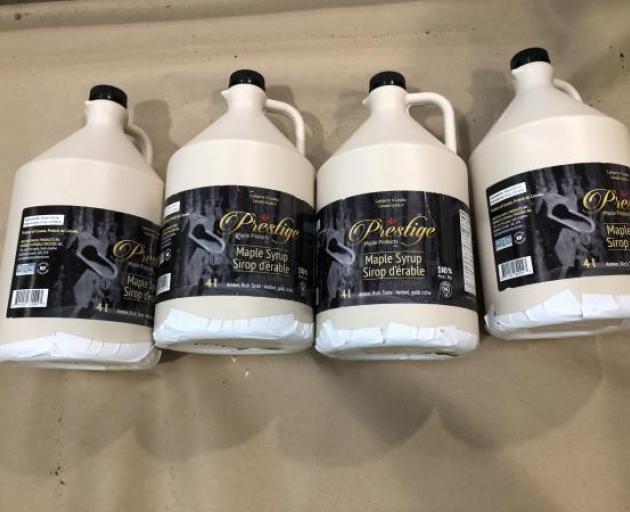
Detective Superintendent Greg Williams, who directs the National Organised Crime Group, told media this afternoon there were “massive profits” for these groups here.
January’s seizure of more than 700 kg was the biggest at New Zealand’s border by more than 100kg, said Williams.
“We’ve seen a surge coming down this way. It’s kind of sad in some ways that we keep coming and saying we’re getting bigger and bigger seizures.”

The operation was upended by New Zealand, Australian and Canadian authorities working together.
The shipment of maple syrup from Canada was found to be concealing 713kg of methamphetamine, which police estimated had a street value of $250 million and would produce around 35 million doses.
It was part of a wider shipment of methamphetamine bound for the Australasian market and New Zealand police worked alongside New Zealand Customs Service on the interception.
Police had to wait for Australian authorities to identify their offenders before they could release news of the New Zealand meth bust, Williams said this afternoon.
“It’s huge, it’s almost a year’s supply of methamphetamine based on wastewater data from January this year.”
Earlier today police revealed the bust and said in February, five men aged between 22 and 45 - all New Zealanders - were arrested at a rural property near Helensville when they took possession of the bulk of the consignment.
A sixth man, aged 28, was also arrested when he sought to take possession of the remainder of the consignment.
Police said they were due to reappear in the North Shore and Auckland District Courts “in due course”.
Police Commissioner Andrew Coster said it was the largest drug bust at New Zealand’s border and authorities cannot afford to relax.
“The international drug trade and organised crime groups are creating havoc and harm in communities around the globe, and our best opportunity to disrupt, intercept and keep our communities safe is to work collaboratively with other agencies, and other nations,” said Coster.
“This seizure of nearly three-quarters of a tonne shows the effectiveness of working across borders.”
Customs NZ Investigations Manager Cam Moore said it takes a network to defeat a network.
“We are very much deliberate and intentional with the way that we operate not only in intelligence and intelligence sharing but also the way we place our liaison officers in key areas around the globe.
“The information flow that we collect goes both ways.”
New Zealand has also helped our allies intercept meth shipments, he said. Customs was always open to receiving information on possible drug importation.
He said 6.2 tonne of drugs had been seized at the border year to date, he said, including a mixture of different types.
Williams said meth can be made into liquid and recrystallised after importation. But in this case, the meth was in crystal form, found inside maple syrup bottles.
“We have been seeing this for a while, there’s a variety of ways, they’ll try anything.
“Anything that’s getting put into what apparently looks like food or drink is absolutely concern... but you’ve got to understand, these people don’t care... this is all about money and greed.”
This syndicate in this organisation was a different syndicate to those involved in the meth that was coming in as kombucha earlier this year, he said.
Over recent years, police have seen “massive sophistication” in the way criminal groups operate, he said.
“That’s what we battle.”
Since 2017 police have routed out 26 international crime cells that have been implanted in New Zealand.
“In New Zealand it’s in every community. It’s hammering our communities.”
International crime groups understood the strength in producing synthetics such as meth, because it was cheap to produce, didn’t require plants, and was incredibly addictive.
“We’ve said in the past that the amount of seizure that we’re seeing seems to far out surpass the amount we’re seeing in consumption.”
Moore said this shipment was caught due to intelligence from Canadian authorities.
Williams said with major jobs such as these, police would sit down with Customs to talk about who was taking the lead.












